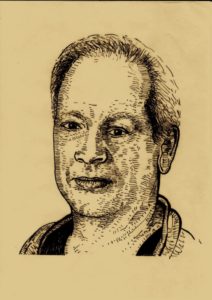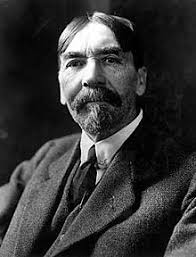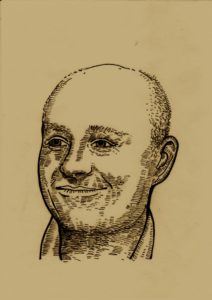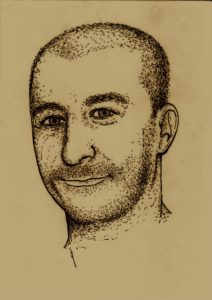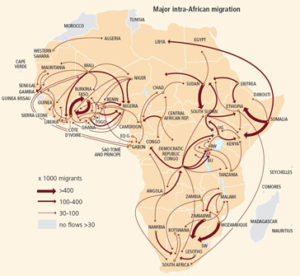Gijs van Oenen ~ Overspannen democratie. Hoge verwachtingen, paradoxale gevolgen
Democratie wordt niet bedreigd door mensen die tegen democratie zijn, maar juist door degene die zeer enthousiast zijn over de democratie, aldus Gijs van Oenen. Wij lijken nooit genoeg democratie te hebben. Het succes van de democratie keert zich nu tegen zichzelf.
“Voor elk vraagstuk dat speelt wordt de democratie verder opgerekt: meer, meer democratie; meer, meer luisteren naar de burger”, aldus Van Oenen. Burgers verwachten teveel van de democratie.
In het essayistisch geschreven boek analyseert Van Oenen het falen van de democratie, waarbij hij het neoliberalisme als een van de belangrijkste oorzaken aanwijst. De democratie heeft zich uitverkocht aan marktkrachten en burgers zijn democratische processen gaan percipiëren in termen van marktgeoriënteerd handelen en consumentisme. Maar ook de tegendemocratie (Baudet en Denk) en populistisch betoog, van zowel links als rechts, dragen bij aan het klimaat van steeds ‘meer, meer’. Ook “wantrouwen, uitdagen en ‘tarten’ vormen (…) een steeds meer geaccepteerd middel of wapen in het politieke repertoire”. De burger ervaart een gebrek aan responsiviteit. De Franse politieke denker Pierre Rosanvallon spreekt in zijn boek ‘La contre-démocratie’ zelfs van een politiek tijdperk van défiance.
Hoe komt het dat dit sentiment nu zo opspeelt, om steeds ‘meer, meer’ te vragen, steeds ‘beter’, ‘beter’, ‘beter’, ‘alles uit jezelf te willen halen’?
We zijn niet opgewassen “tegen processen die een onverbiddelijke economische, technologische of financiële logica volgen” die overheersend zijn in onze democratie; dan kom je met burgerparticipatie niet ver. De openbaarheid staat zwaar onder druk van “vermarkting en financialisering, en daarnaast ook van ontwikkelingen rondom nieuwe media, tegenpublieken, globalisering en interculturalisering”, aldus Oenen. De participatie paradox heeft tot een scheve democratie geleid.
Van Oenen ziet als belangrijkste probleem van de democratie dat zij het te goed doet, de burger en de overheid te hoge verwachtingen hebben, van zichzelf en de ander. De democratie raakt overspannen. We overvragen ons. Burgers koesteren sterke interactieve verlangens, maar beginnen te lijden aan ‘democratische metaalmoeheid’. De interactieve druk van de bestaande institutionele orde, de pressie om voortdurend interactief te zijn, dragen daartoe bij. Commentatoren die juist concluderen dat de politiek en democratie aan het opleven zijn kijken slechts naar politieke partijen en naar stemgedrag bij verkiezingen.
Oenens diagnose is gebaseerd “op een bredere opvatting van politiek en democratie. Ik zie democratie als een levenswijze en een cultuur, die haar neerslag vindt in de instituties van de moderne burgerlijke samenleving”.
Voor de burger is het een te zware last om voor alles medeverantwoordelijk te zijn en nu krijgen we de rekening gepresenteerd. Er rust een ’culturele stress’ op mensen. Dat leidt tot ‘interpassiviteit’, een onvermogen om de democratische last te blijven dragen, maar ook tot protest.
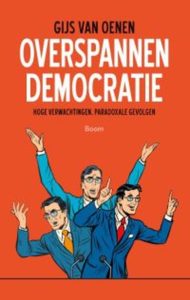 Als oplossing voor deze door Van Oenen als stress gedefinieerde situatie, een overspannen democratie, reikt hij het algoritmesysteem aan dat eindeloze combinaties kan doorberekenen, algoritmen die ons peilen. De overheid moet de verwachtingen van de burger zo goed mogelijk proberen waar te nemen, responsief te worden, door te luisteren maar vooral met peilingen en algoritmische bewerkingen van grote databases. Het bestuur is in staat en bereid de interactieve inbreng van de burger zo voor eigen rekening te nemen.
Als oplossing voor deze door Van Oenen als stress gedefinieerde situatie, een overspannen democratie, reikt hij het algoritmesysteem aan dat eindeloze combinaties kan doorberekenen, algoritmen die ons peilen. De overheid moet de verwachtingen van de burger zo goed mogelijk proberen waar te nemen, responsief te worden, door te luisteren maar vooral met peilingen en algoritmische bewerkingen van grote databases. Het bestuur is in staat en bereid de interactieve inbreng van de burger zo voor eigen rekening te nemen.
Hij kiest hierbij voor een tweesporenbeleid, die van de democratie en een algoritmesysteem dat voor ons de democratie kan berekenen. De algoritme dienen als coach van de maatschappij en is de beste hoop voor consensus.
En eigenlijk kunnen we hier ons ook niet meer aan onttrekken: deze ontwikkeling is al in gang gezet en is niet meer te stuiten. De toekomst is een algoritmische democratie, een ‘postinteractieve’ systeem van democratie.
Van Oenen vertrouwt op het algoritme systeem, maar stelt niet de essentiële vraag of het algoritmische systeem neutraal kan zijn, zonder afwegingen die vooraf zijn gemaakt.
Kan de democratie overleven zonder maatschappelijk debat en betrokkenheid van haar burgers? En is Van Oenen niet te negatief over burgerparticipatie? Willen mensen juist niet betrokken zijn bij maatschappelijke ontwikkelingen en worden gerepresenteerd in politieke besluitvorming?
—
Gijs van Oenen is universitair hoofddocent filosofie aan de Erasmus Universiteit. Hij is een van de auteurs van Booms filosofiemethode Durf te denken!
Overspannen democratie. Hoge verwachtingen, paradoxale gevolgen.
Paperback ISBN 9789024419654 – E-book9789024419661 – Boom Uitgevers, Amsterdam, 2018
Een paar jaar geleden organiseerde Felix Meritis, Europees centrum voor kunst, cultuur en wetenschap en AMSU de workshop ‘Active citizenship. How to make it work? in het kader van een meerjarig programma Het huis van de burger.
What is the role of the citizen in a rapidly changing society? How should active citizenship in everyday practice work?
Zie:
Linda Bouws – St. Metropool Internationale Kunstprojecten
